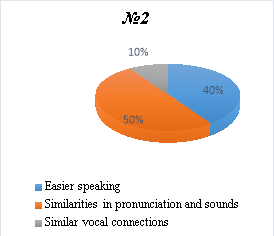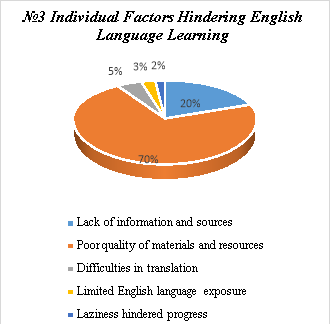This article explores the challenges of learning English as a second language in Kazakhstan, including grammar and pronunciation differences, limited exposure to English, a lack of quality learning resources, pressure to learn, and cultural differences. The article emphasizes the importance of English language learning in Kazakhstan and recommends analyzing multiple sources of information, conducting interviews, and developing a plan to address the identified issues.
Keywords: English language learning, Kazakhstan, challenges, factors, grammar, pronunciation, exposure, learning resources, pressure, cultural differences, survey, age groups, solutions, benefits, practical use, independence, research, analysis, interviews, plan.
В данной статье рассматриваются проблемы изучения английского языка как второго языка в Казахстане, включая различия в грамматике и произношении, недостаточное знакомство с английским языком, отсутствие качественных учебных ресурсов, давление, оказываемое на учащихся, и культурные различия. В статье подчеркивается важность изучения английского языка в Казахстане и рекомендуется проанализировать многочисленные источники информации, провести интервью и разработать план по решению выявленных проблем.
Ключевые слова: изучение английского языка, Казахстан, проблемы, факторы, грамматика, произношение, воздействие, учебные ресурсы, давление, культурные различия, опрос, возрастные группы, решения, преимущества, практическое использование, независимость, исследование, анализ, интервью, план.
Introduction: English has become a global language, and the ability to communicate effectively in English is increasingly important for those seeking to pursue higher education or job opportunities. In Kazakhstan, where Kazakh and Russian are the official languages, there is a growing emphasis on the importance of learning English as a second language. However, many Kazakh students face a number of challenges in developing their English language skills. In this article, we will explore the challenges of learning English as a second language in Kazakhstan, including differences in grammar and pronunciation, limited exposure to English, a lack of quality learning resources, pressure to learn, and cultural differences.
This topic is very relevant because everyone is learning English now and try to use it more and more.
Aim of the study: This research aims to identify the challenges encountered during the process of learning English as a second language in Kazakhstan. The study involved surveying individuals from different age groups, ranging from teenagers to the older generation, to gain insight into the different problems faced by learners. The survey results will be analyzed to form a conclusion, draw expected outcomes and derive solutions.
Hypothesis: The older generation will have more difficulty learning the language and they will end up with more problems than younger people, but if problems occur, they will probably be similar.
Stages, research procedure: Interviewing people of different generations, on the basis of the questionnaire we find out the number and problems, difficulties.
Results of work and conclusions: The results of the survey revealed that the majority of respondents face the problem of lack of quality material in the Kazakh language or its complete absence, but similarities were found that can help and provide assistance, facilitate the study of the language.
Areas of practical use of the results : Creation and coming to possible solutions to the problems tormenting our population while learning English
Novelty of research and degree of independenceusing the distinction between generations and trying to come to ways of solving problems.
What steps can be taken to achieve the research goal?
To achieve the research goal, it is important to study all necessary information, compare answers from different age groups, and develop solutions to the identified issues. The recommended methods include analyzing multiple sources of information and conducting interviews with students and parents. These steps can lead to a better understanding of the challenges and possible solutions related to learning English as a second language in Kazakhstan.
Ways and means to achieve the goal:
Analysis of websites , multiple sources of information, study of articles, interviews with students.
MAIN PART:
№ 1 . Challenges in Pronouncing English Vowels and Consonants for Kazakh Language Learners.
There are nine vowels in Kazakh language and there are six in English alphabet. English has simple syllables that are phonetically short and convenient. For instance, when introducing vowels, the main differences between the vowel systems of the two languages should be underlined: 1. English allows two or three vowel combinations, while Kazakh does not. For example, the English words eat, faint, meet, built, tie, and bye are combinations of ea, ai, ee, ui, ie, and ye, which are not alphabetic and are read differently. Kazakh, however, is read with all vowels sounding like their alphabetic names. Words where we can find two or three vowels can be read as one sound, but it is different in Kazakh, for instance, in the words audit, meat, pain, built, vowels are read as follows: au [o:], ea — [i:], ai — [ei], ui — [i], ie [i:]. The same vowel sound can be read differently depending on its position in the word and the type of syllable. For example, different types of syllables read «a« as different sounds, but not as in the alphabet. In these examples, you can see that «a« is pronounced as different sounds. Kazakh learners will struggle with English words like ban-barn similar, me-meet-meat-mere her, fan-fun, tune-fur-pure, cot-caught. This is because the same letter is pronounced in different ways in different cases, and different vowels are read as the same vowel, i.e., Kazakh vowels are not distinctive.
In English, vowels are classified into long and short sounds according to their articulation. Pronouncing long and short sounds more clearly is very important because it can change the meaning of a word.
The letter “e” in English language at the end of the word is not pronounced every time.
This letter only shows only the type of syllable, which also differs from Kazakh. The above vowel features are not present in Kazakh.
Pronunciation of vowels is also difficult because, although there are similar sounds, they are sometimes pronounced differently from Kazakh vowels. For example, English [a:], [x], [o], [u], [u:], etc. are similar to Kazakh [a], [o], [y]. However, their pronunciation is different. In Kazakh, [a], [o], and [u], which correspond to English vowels, are classified as labial, while in English they belong to the compound nucleus. In Kazakh [u] is a forward sound, while in English it is not.
Consonants are sometimes omitted in English, which is also not allowed in Kazakhstan. For example, in the combination of consonants kn, lf, sc, mb, bt, mn, one of the consonants is not read. In other words, the combination of two consonants is read as one consonant. Therefore, Kazakh students will find it difficult to read English words such as know, knife, knit, science, scissors, tomb, bomb, column, debt, cash, shelf, etc. The English consonants [ð], [i] and [w]do not exist in Kazakhstan. Kazakh students usually replace these sounds with [s,z, v].Thus, English oppositions such as thistle-this'll, ether-either, think-sink, bath-bus, breathe-breeze, will-yield, want-vote become awkward for Kazakh students. English [t] and [d]are vesicular, while in Kazakh they are dental. However, this difference is not a big problem in learning English. This is because replacing the dentate consonants with vesicular ones does not really affect or disrupt communication in English. However, in Kazakhstan, dental consonants are pronounced without stress, whereas in English they are pronounced with stress, especially at the end of words and in single words. Kazakhstan currently has no infrastructure for the use of English. As a result, it can be difficult for English language learners and students to improve their speaking and listening skills.
№ 2 . The Impact of Limited Resources on Learning English in Kazakhstan
All documents are made in Russian and Kazakh, and it is almost impossible to find options in English, besides all those who study English will face problems of lack of practice of speaking skills, because in our country not everyone speaks and understands English language.
In our country it is difficult to learn English from the Kazakh language, all this is to blame for low-quality resources and their limitations. This can have a very negative impact on English language learners and the lack of resources provides poor quality education. In the country, the society, and the students of English learners, whether it is family, colleagues, or classmates, in the society, English learners will more easily receive support from different people offering various help and pressure from the society that cannot be met in the country, this will help students to continue further and take your knowledge to a higher level.
These are two culturally different countries, and the patterns of formation and use of English and Kazakh names are cross-cultural. The differences in the use and formation of names have to do with linguistic and socio-cultural aspects, but mainly with parental choice, intention, and creativity. Linguistic creativity is a particularly interesting feature of name formation in both languages.
№ 3. Cultural and Linguistic Differences in English and Kazakh Naming Systems
The formation and use of names reflects the cultural and linguistic context surrounding the family, blurring common nouns in comparison to main nouns and blurring main noun categories to challenge and explore lexical and nomenclatural patterns. From a linguistic perspective, the general rules of word formation and the semantic features associated with nouns are explored.
Religion significantly influences the anthropological systems of both languages. The socio-political and historical-cultural processes occurring in the social life of people play an important role in the development and formation of the anthropology of Kazakhstan and England. Not only Kazakh, but also English Puritan names can contain the meaning of the phrase — Barzhaқsy (all is well), Zholzhaқsy (the path is good), Allaberdі (of gave), Kүntuar (east). Modern British and Americans, as well as Kazakhs, sometimes return to traditional naming, enriching the borrowings from other languages and inventing new names.
№ 4. Limited Exposure to English in Daily Life
In Kazakhstan, English is not commonly used in everyday life, which makes it difficult for learners to practice their language skills outside of the classroom. Most people speak Kazakh and Russian, which limits the opportunities for English learners to immerse themselves in the language and use it in real-life situations. This lack of exposure to English in daily life can hinder the progress of learners and make it difficult to develop their speaking and listening skills.
№ 5 . Cultural Differences and Misunderstandings
Learning a new language also involves understanding and navigating cultural differences. English learners from Kazakhstan may encounter cultural differences that can lead to misunderstandings and communication breakdowns. For example, cultural norms and customs related to greetings, gestures, and body language can differ between cultures, and these differences can affect communication in English. Additionally, different countries may have different expectations for professional communication, which can create challenges for learners who need to communicate in English for work or business purposes.
№ 6 . Lack of Qualified English Teachers
The quality of English language education in Kazakhstan is also affected by the availability of qualified teachers. Many schools and language centers in Kazakhstan face a shortage of English teachers who are properly trained and qualified to teach the language effectively. This can lead to inconsistencies in the quality of instruction and can make it difficult for learners to receive the support they need to improve their language skills. Additionally, teachers may face challenges in keeping up with the latest teaching methods and materials, which can impact the effectiveness of their instruction.
Part 2. Key findings from the survey
After surveying 100 students from 9th and 10th grade, which represents approximately 10 % of the total number of students in this age group [ Table № 1 ]. Of these students, 70 % reported that the poor quality of materials and resources was the main problem that hindered their English language learning. Another 20 % mentioned the lack of information and sources in the Kazakh language for study, while 5 % noted difficulties in translation [ Table № 2 ].


Additionally, 3 % of students stated that the absence of English language in the country made it difficult to develop advanced skills, and 2 % admitted that their lack of progress was due to laziness. On the positive side, 50 % of students observed similarities in aspects of pronunciation and sounds between Kazakh and English, which were beneficial for further studies. Speaking was easier for 40 % of students, and 10 % noted that vocal connections were also similar. Some students also found ease of learning related to cultural similarities between the two countries [Table № 3] .

These results indicate that the challenges facing English language learners.
Background Information on English Language Learning in Kazakhstan
According to the Kazakhstan National Report on Education for All (2015), only 7.3 % of Kazakhstani citizens have a proficient level of English. This low level of English proficiency has significant implications for the country's economy and job market.
A survey conducted by the British Council in Kazakhstan (2019) found that 79 % of employers in Kazakhstan require their employees to have good English skills, but only 28 % of job seekers meet this requirement. This indicates a significant gap between the demand and supply of English language skills in the country's labor market.
Another survey conducted by the British Council in Kazakhstan (2018) found that the lack of qualified English teachers is the biggest challenge in learning English in the country, according to 68 % of respondents. Additionally, 61 % of respondents believe that the lack of access to high-quality learning resources is a major challenge in learning English in Kazakhstan.
These challenges are reflected in Kazakhstan's ranking on the EF English Proficiency Index (2021), which ranks the country 73rd out of 100 countries in terms of English proficiency, with a score of «low proficiency».
Addressing these challenges will require a concerted effort by the government, educators, and other stakeholders to improve the quality of English language education in Kazakhstan and provide more opportunities for students and workers to improve their language skills.
Elderly people
Older people also face learning problems that are very similar to those of the younger generation, but in addition to these problems, such as resource issues, adults also face problems in memorizing new material and tasks that hinder language learning.
Part 3. Benefits of learning English language:
Benefit #1: Improve and widen employment opportunities.
As the primary language of global communication, English proficiency is a highly sought-after skill in the international workplace, and one of the benefits of learning English is that it greatly increases job opportunities.
It is also widely recognised that those with second language fluency, whether they are bilingual or have studied a foreign language, can generally expect a higher salary (up to 10 % — 15 %) than those without.
English has been the international language of science and medicine since the mid-20th century, not to mention the business world and international trade. English is also the primary language of the Internet. It is estimated that 565 million people use the Internet every day and that 55.5 % of the world's most visited websites are displayed in English.
Benefit #2: Explore the world with confidence.
As well as countries where English is the main language, such as the UK, United States, Canada, New Zealand and Australia, there are scores of different countries which also list English as an official language! These include Malaysia, Singapore, Fiji, Kenya, Hong Kong, India, Mauritius and the Philippines.
Benefit #3: Access world-class education systems and establishments.
Another reason to study English is to have access to some of the best educational systems and institutions in the world. Proficiency in English language is a crucial requirement for admission to some of the top universities in the United Kingdom and the United States. Since English is the primary language used in these institutions, it is important for applicants to possess good English language skills.
Benefit #4: Increase your cognitive ability (aka, brain power!)
Learning a second language has proven to be one of the best ways to keep the brain active. Studies have shown that when a second language is learned, the brain undergoes changes in electrical activity, structure, and even size.
Benefit #5: Start a life in an English-speaking country.
Another advantage of learning English is the opportunity to move to an English-speaking country. Citizenship in an English-speaking country often requires a certain level of English. Speaking and understanding English can improve your chances of getting a job and help you communicate well with the people around you, such as in supermarkets, with doctors, new friends, and neighbors.
Benefit #6: Improve communication skills.
Learning English as a second language also means learning new ways of thinking and expressing yourself through words and letters. By learning more than one language, you will learn how language itself works and how to use it to communicate with others in all social, educational, and professional situations, and you will learn to communicate more clearly in any language.
Benefit #7: Open up a world of entertainment and popular culture.
Many world-famous films and television programs are made in English, many of them in Hollywood. If you are fluent in English, you can enjoy and appreciate them in the original, with or without subtitles. Watching and reading English-language media will also improve your language skills, especially your listening and reading skills. Exposure to world-famous pop culture will also help you practice your speaking skills, and the topics you can talk about are endless!
Benefit #8: Improve your confidence.
Learning a foreign language is a sought-after and admirable skill, whatever your motivation for learning it. The main benefit of learning English or any other foreign language is the pride and confidence that your language skills will help you to work, travel and communicate with people from different cultures and backgrounds in different parts of the world. Confidence will take you far in today's world and learning a new and useful language will certainly help you achieve this.
Part 4. Methods. Ways to learn English language.
Today we can find various ways to improve our English learning. Each method helps in different ways, affects certain skills, and has different functions.
For instance, learning through films and movies. Students improve and intensify their learning with use of the films. Listening and speaking are skills that movies can improve. Motivation is one of the most important factors for successful second language learning. Movies and TV programmes are part of students' lives, and it makes perfect sense to bring them into the language classroom. As motivators, films can make the language learning process more interesting and fun. Another advantage of using films is that they provide an authentic and diverse source of language. Films give students examples of using English in 'real' situations outside the classroom, particularly interactive language (real conversational language). The films expose students to natural expressions and the natural flow of conversation. For students who do not live in an English-speaking environment, movies and television may be the only way to provide real language input. The visual nature of film is a valuable language teaching tool that allows students to understand more by interpreting language in a full visual context. Films can aid students' comprehension by allowing them to listen to spoken conversations while viewing visual supports such as facial expressions and gestures. These visual cues support the language message and become the focus of attention. So, it would be easier to overcome the obstacles that may appear in learning English from Kazakh language if we use films as an eye of information.
Some students like to learn new language with use of the games, and it is also a way of learning. It is the way where you learn it with fun and cheerful. You can practice your speaking skills in co-op games, such as cs go, Minecraft, dota2 and etc. because, when you need to give some information to your partner you have to speak on the language that you are learning. Teenagers who were interviewed came to the same conclusion that it was their generation that was developing or learning English through games. Learning exercises combined with games can help to teach and improve the competence of language learners. In addition, students' performance can be higher than traditional teaching if they practice English using games. It is a strong recommendation for teachers to refer to games when teaching difficult tasks to maintain an interesting teaching environment. Games should be recognised as an element of the educational process and students should benefit from games related to English language learning at the appropriate time and place in the teaching-learning process.
|
Method s / Approach es |
Description |
|
Improves listening and speaking skills, provides an authentic and diverse source of language, exposes students to natural expressions and flow of conversation, aids comprehension through visual context |
|
Makes learning fun and cheerful, provides opportunities for practicing speaking skills in co-op games, improves language competence, enhances students' performance |
|
Focuses on grammar rules and translation exercises |
|
Emphasizes oral communication and avoids translation |
|
Focuses on repetitive drills of dialogues and pronunciation |
|
Emphasizes communication in real-life situations |
|
Focuses on completing communicative tasks |
|
Uses content from other subjects to teach language |
|
Emphasizes the importance of vocabulary acquisition |
|
Provides opportunities for practicing language skills with native speakers |
|
Independent learning through various resources, such as textbooks, online courses, and language apps |
Note: These methods, techniques, approaches, and procedures are not exhaustive and can be combined and adapted based on learners' needs and preferences.
Conclusion
In conclusion of the research work, we come to the conclusion that the study of the Kazakh language and Kazakh-speaking students of English in Kazakhstan as a second language may have some problems associated with resources, their lack, materials and their quality and the correct, incorrect translation of words into the Kazakh language, problems with the lack of listening practice speaking practice in Kazakhstan due to the infrastructure not adapted to English, however there are pluses such as sounds, phonetic connections and others that actually can make learning easier, traditional features also have their effect on learning English. According to the results of the survey, it can be concluded that the majority have problems. Therefore, some students solve these problems with different teaching methods, mainly developing those skills that are lacking in Kazakhstan. All in all, every issue, every problem has its solution. We can use all of it to help developing English language as second language for Kazakh speaking and Kazakh learners.
References:
- British Council. (2019). «English in Kazakhstan: current state and future prospects». Retrieved from https://www.britishcouncil.kz/sites/default/files/english_in_kazakhstan_report_2019.pdf
- British Council. (2018). «English in Kazakhstan: An investigation into the impact of language on employability, social mobility and internationalisation». Retrieved from https://www.britishcouncil.kz/sites/default/files/english_in_kazakhstan_report_2018.pdf
- EF Education First. (2021). «EF English Proficiency Index». Retrieved from https://www.ef.com/wwen/epi/
- Kazakhstan National Report on Education for All (2015). Retrieved from https://unesdoc.unesco.org/ark:/48223/pf0000232498
- Tomalin, B., & Stempleski, S. (1993). «Films, videos and television in language teaching». Oxford: Oxford University Press.
- Zhu, P. (2012). «Using Games to Enhance EFL Students' English Learning Motivation». Theory and Practice in Language Studies, 2(1), 79–85.











